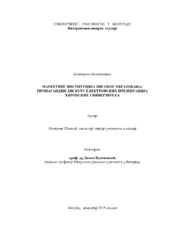Маркетинг институција високог образовања: пропагандни дискурс електронских презентација eвропских универзитета
doktorska disertacija
Metapodaci
Prikaz svih podataka o zapisuDoktorand:
Шмакић, КатаринаFakultet:
Докторске дисертације на УниверзитетуDatum odbrane:
19-04-2016Mentor:
Вуксановић, ДивнаČlanovi komisije:
- Јевтовић, Зоран
- Смиљанић, Дамир
- Ћаловић, Драган
- Илић, Влатко
Sažetak
У раду се проучава процес генерисања пропагандног дискурса електронских презентација европских универзитета у земљама које су потписнице Болоњске декларације. Промене настале у последње две деценије у домену високог образовања у Европи наметнуле су нове правне оквире институцијама високог образовања и потребу за усвајањем и усклађивањем националних система високог образовања са јединственим европским системом високог образовања. Националне владе усвајају овакве планове, али нису у стању да финансијски подрже институције са повећаним бројем студената, одакле произлази препорука универзитетима да проналазе изворе финансирања који неће бити из државног буџета. Институције високог образовања у европском простору своју будућност виде у правилном избору маркетиншке стратегије, а електронске презентације нуде могућност најкомплетнијег представљања институције високог образовања ширем аудиторијуму. Институције високог образовања своју циљну групу корисника виде у омладини, која је стекла услов... за упис на високошколску институцију, а с обзиром на то да су дигитални медији и онлајн комуникација неодвојиви део свакодневнице већине данашње омладине, електронска презентација је оптимално средство за представљање институције управо овој циљној групи. Овако уклопљени елементи на релацији потенцијални корисник и представљање институције путем електронске презентације, која се користи као алат промоције услуга, отварају простор за пропагандни дискурс и имплементирање прикривених социокултурних намера у жељени простор представљања. Анализа карактеристика пропагандног дискурса електронских презентација институција високог образовања у европском простору има потенцијал да буде извор развијања „новог“ језика који, како ћемо у раду показати, заправо кореспондира са класичним маркетингом, при чему су пропагандне намере само део маркетиншких комуникација у академским оквирима.
The thesis discusses the process of generating propaganda discourse through electronic presentations of European universities from countries that are signatories of the Bologna Declaration. Changes made in the last two decades in the field of higher education in Europe have imposed a new legal framework on higher education institutions and the need to adopt and harmonize national systems of higher education with a unique European system of higher education. National governments adopted such plans, but they are unable to financially support institutions with an increased number of students, hence, the universities are being encouraged to find sources of funding that will not come from the state budget. Institutions of higher education in the European area see their future in the proper choice of marketing strategies which could provide better market position, and the electronic presentations offer the most convenient means for comprehensive presentation of higher education institution t...o the target audience. The institutions of higher education recognize their target group of users in the youth eligible for admission to a higher education institution, and due to the fact that digital media and online communications are an integral part of everyday life of most of today's youth, the electronic presentation is the optimum means of presenting institution precisely to this target group. The elements incorporated into the electronic presentations, which are used as a tool for the promotion of services, are opening up the space for propaganda discourse and the implementation of hidden socio-cultural intentions within the field of representation, in regards to potential users and their relation to the institutions. The analysis of characteristics of the propaganda discourse of higher education institutions' electronic presentations in the European area of education has the potential to be a basis for of development of the "new" language, as we will show in this thesis, actually corresponded to the classic marketing, with intentional propaganda distinctive for the marketing communication in the academic context.

